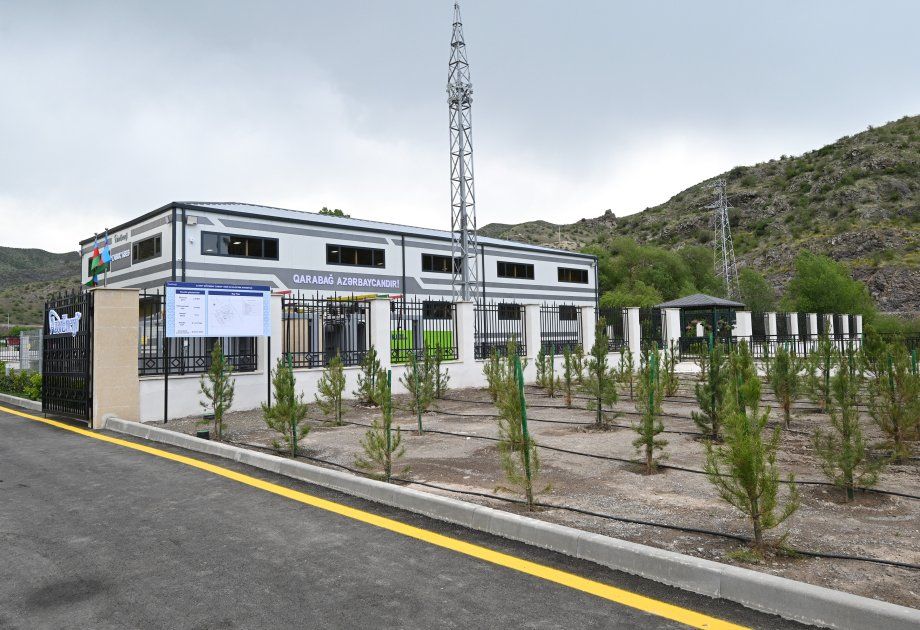Green energy drive gains momentum with launch of two hydropower plants in Laçın

Azerbaijan's investment in renewable energy continues to show promising results, particularly through the recent launch of two small hydropower plants, "Zabux" and "Qarıqışlaq," in the country’s Laçın region. Since their inauguration in May 2024, these facilities have produced a combined total of 21 million kilowatt-hours (kWh) of electricity by May 1, 2025, an achievement that highlights the growing potential of renewable energy sources in Azerbaijan. These small-scale hydropower plants offer a glimpse into the country’s future energy landscape and provide an opportunity to align with global sustainability goals.
The statistics from the two plants are noteworthy. "Zabux" KSES has produced 11.6 million kWh of clean electricity, while "Qarıqışlaq" KSES has generated 9.4 million kWh. This output not only demonstrates the viability of hydropower in Azerbaijan but also marks a significant step toward reducing the nation's reliance on fossil fuels. These plants, powered by the Zabux and Qarıqışlaq rivers, are designed to produce eco-friendly energy, and their operations are in line with Azerbaijan’s broader goal of increasing its renewable energy capacity. The plants' total capacity of 6.8 megawatts (MW) is a modest but impactful contribution to the country’s energy mix, with "Zabux" operating four hydro aggregates, each producing 0.7 MW, and "Qarıqışlaq" generating 4 MW through one hydro aggregate.
What stands out about these plants is their environmentally friendly design. Unlike traditional power plants, small hydropower stations (KSES) like "Zabux" and "Qarıqışlaq" do not emit greenhouse gases, which is critical in the context of the ongoing climate crisis. The global consensus is clear: the energy sector must shift away from fossil fuels to more sustainable, clean energy sources. The European Union, for example, has set ambitious renewable energy targets for 2030, and Azerbaijan's efforts to increase the share of renewable energy in its energy production are both timely and essential.
By producing electricity without the environmental harm associated with coal, oil, or natural gas power generation, these plants contribute to Azerbaijan’s efforts to reduce its carbon footprint and meet its obligations under international climate agreements. The ecological benefits are clear: no greenhouse gases are emitted into the atmosphere, and the operations do not pollute local water bodies or disrupt surrounding ecosystems. This ecological advantage is a selling point for Azerbaijan as it looks to bolster its renewable energy portfolio and attract further investments in sustainable projects.
Small hydropower, big potential
Although the installed capacity of 6.8 MW for these two stations might appear small in comparison to large-scale power plants, the real value lies in their decentralized production model. Small hydropower stations provide a more flexible and resilient energy solution, especially in rural and less developed areas. They are capable of delivering power to local communities, reducing dependence on centralised grid systems, and enhancing energy security. Moreover, these plants can be scaled up or replicated in other regions, amplifying their positive impact.
Azerbaijan's strategic investment in small-scale hydropower is also aligned with global trends. Many countries, particularly those with abundant water resources, are turning to smaller hydropower solutions as part of their renewable energy strategies. The development of these projects allows Azerbaijan to diversify its energy sources, reducing the risk of over-dependence on oil and gas revenues, which have traditionally dominated the country’s economy. By moving toward sustainable energy solutions, Azerbaijan is not just addressing environmental concerns but also creating economic opportunities for local communities, especially in remote and rural areas.
The success of the Zabux and Qarıqışlaq plants underscores the immense potential of small hydropower in Azerbaijan’s energy landscape. These plants have proven that it is possible to produce clean, renewable energy in an environmentally responsible way, while simultaneously contributing to the country’s energy security. The government’s decision to invest in these projects should be seen as a proactive step toward a greener and more sustainable future.
However, this is just the beginning. Azerbaijan must continue to prioritize renewable energy, including solar, wind, and hydropower projects, in its energy policy. As the world moves toward carbon neutrality, Azerbaijan’s commitment to clean energy will not only serve its environmental interests but also bolster its standing on the international stage as a forward-thinking and responsible nation.
Here we are to serve you with news right now. It does not cost much, but worth your attention.
Choose to support open, independent, quality journalism and subscribe on a monthly basis.
By subscribing to our online newspaper, you can have full digital access to all news, analysis, and much more.
You can also follow AzerNEWS on Twitter @AzerNewsAz or Facebook @AzerNewsNewspaper
Thank you!

